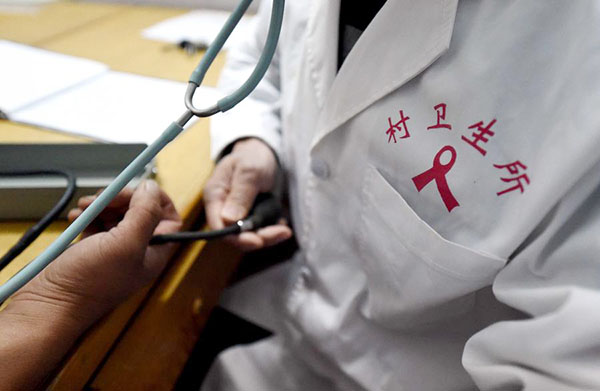Ending AIDS is not an unreachable goal
Updated: 2015-12-01 07:53
By Catherine Sozi and Bernard Schwartlander(China Daily)
|
|||||||||
 |
|
An HIV positive patient, not pictured, receives a blood pressure test in Weishi county, Central China's Henan province in this Nov 30, 2015 file photo. [Photo/Xinhua] |
In the not-so-distant future, it is plausible that AIDS could be something we read about in history books rather than newspaper headlines. Last September, China, along with other member states gathered at the United Nations, adopted the Sustainable Development Goals and committed to ending AIDS as a public health threat by 2030. On this World AIDS Day, the UN is calling on the international community to start delivering on this promise.
We know that China can achieve incredible things when it sets its mind to a challenge-demonstrated by the fact that an astonishing 660 million people were lifted out of poverty in the last generation. The same spirit of determination, pragmatism and optimism which led to that extraordinary achievement now needs to be embraced to end the AIDS epidemic. While its overall infection rates remain low, China remains in the top fifteen countries worldwide for the total number of people living with HIV, and for new infections. The virus keeps spreading-and it is time to stop it in its tracks.
We know what needs to be done: social attitudes and support for the communities most affected by HIV need to change, so that these communities are better equipped to protect themselves from HIV, and have better access to testing and early treatment if they are living with HIV. In the case of China, this means doing more to support men who have sex with men (MSM).
While overall the number of new infections has been rather stable in China, and the vast majority of new infections remain heterosexual, homosexual transmission has increased from 2.5 percent in 2006 to almost 26 percent among all cases this year. This is not just an issue in China: in Asia, men who have sex with men are 19 times more likely to be living with HIV than the general population. We must tackle the stigma and discrimination that stops MSM from getting tested early and getting into treatment.
Men who have sex with men are already stigmatized, and they face a double burden of stigma when they are living with HIV-making it difficult for them to access available services. But overall, services for this key population remain under-resourced and of insufficient scale.
Related Stories
S. African govt vows to achieve Aids-free generation 2015-11-30 10:22
Young male students hit hard by HIV/AIDS 2015-11-27 07:51
Mobile payments bid aids poverty fight 2015-11-26 08:06
Gay sex blamed for rise in young students with HIV/AIDS 2015-11-25 20:11
Today's Top News
Inspectors to cover all of military
Britons embrace 'Super Thursday' elections
Campaign spreads Chinese cooking in the UK
Trump to aim all guns at Hillary Clinton
Labour set to take London after bitter campaign
Labour candidate favourite for London mayor
Fossil footprints bring dinosaurs to life
Buffett optimistic on China's economic transition
Hot Topics
Lunar probe , China growth forecasts, Emission rules get tougher, China seen through 'colored lens', International board,
Editor's Picks

|

|

|

|

|

|







